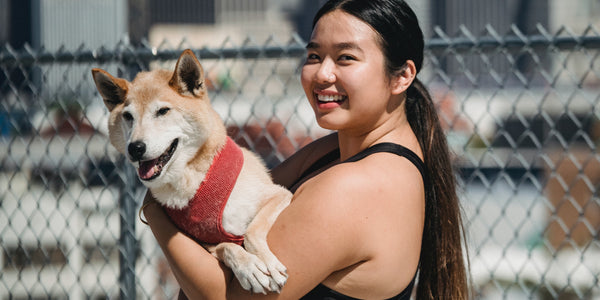A loyal furry friend who gives you the best of both worlds. A Japanese Spitz can be an adorable best pal as well as a fierce guard dog. This fairly new breed is quite rare, but extremely popular nonetheless.
With their deep brown eyes, curvy tails and fluffy white coats, Japanese Spitz dogs are quite a sight! Continue reading to see if it is the perfect breed for you and your home.
History

This rare breed first came into existence in Japan in the late 1920s as a crossbreed between the Japanese Samoyed Spitz, Russian Spitz and German Spitz dogs. Just the American Eskimo dogs, the Japanese Spitz were the mini companions of the much larger Samoyed Spitz.
These mini companions only became a popular breed of their own after the second world war. Owners from English, Sweden, as well as Japan started to love this breed.
The Japanese Spitz breed became official with the Dog Registry of America, American Pet Registry, American Canine Association and American Canine Registry in 1977. The only American organization for dogs that did not recognize this breed was the American Kennel Club. Their reason was that the Japanese Spitz are too similar to the American Eskimos dog breed.
Worldwide organization for dogs such as the Fédération Cynologique Internationale, the UK Kennel Club, Canadian Kennel Club and of course the Japanese Kennel Club recognizes the Japanese Spitz dog breed.
Features

Japanese Spitz dogs have a shoulder height of 10 to 16 inches (25.5 to 40.6 cm) generally. Their typical weight is anywhere between 10 to 20 pounds (4.5 to 9 kg).
They are similar to a Pomeranian dog in structure and appearance and they have outstanding similarities to American Eskimo dogs.
Their plush white coat is what sets these dogs apart. They have a full and thick mane at the neck area and shorter hair on their back legs.
They have fluffy, lightweight white coat, curly tails and a relatively long snout and ears that stand straight up. Their expressive dark eyes are makes everyone fall in love.
Temperament

Social Behaviour
This loyal breed may not be ideal for every family. They may tend to be protective of their owners and their space but a lack of socialisation, proper care and training, may result in aggressive behaviour. Due to their protective nature, they do make excellent watch dogs, their surprisingly loud bark will alert your visitors as well as potential intruders.
Despite their fierce personality, they can be very sociable if properly trained and introduced to strangers. It is very important to socialise your Japanese Spitz with dogs and humans at an early age. This way, they are used to being around strangers and other dogs.
Fortunately, Japanese Spitz dogs respond well to behavior training. It is best to train them in a way that they hear their owner’s voice or sense their presence, to feel calm, safe and ultimately show good behaviour.
Energy Level
They have a moderate energy level, making them perfect house pets. Although they also enjoy going for long walks and extended playtime. A large home is ideal for this breed because this gives them the freedom to move around.

Relationship with Humans
Sitting down, relaxing and spending time with their humans is also one of their favourite things to do. They tend to suffer from separation anxiety if left alone too long. Therefore, it is best that you spend as much time with your Japanese Spitz as you can. Shower them with love and cuddles!
They can adjust to apartment life as long as they are walked at least once a day and can engage in exercise.This breed is an ideal dog for first-time dog owners due to their good nature and trainability.
Health and Lifespan

The average lifespan for a Japanese Spitz dog is 10 to 16 years. They do not suffer from many health issues. However, like any animal, they can develop a variety of illnesses over the years. Regular veterinary appointments and vaccinations can help prevent such issues.
The most common health concerns for Japanese Spitz dogs are a condition called Luxating Patella. This is a disorder in which their kneecap can become dislocated and can lead to issues such as osteoarthritis if not properly diagnosed and treated.
Another issue common to this breed is runny eyes due to their small tear ducts. If their eyes are not cleaned regularly, they can end up with watery eyes and skin sores, which can then become infected.
Here are some popular eye care solutions available at Kohepets:

Grooming

As their skin tends to dry out from too much moisture, Japanese Spitz dogs do not need to be bathed as frequently as other breeds. Their coat has a certain texture on which dirt and mud can be easily removed.
Japanese Spitz dogs only shed once a year for about two weeks. Despite being a breed with minimal shedding, they should still be brushed daily during this time, and every 2 to 3 days otherwise. This will prevent their hair from becoming attached to your clothes or furniture.
Trim their nails regularly to keep them from accidentally scratching you or your furniture. As well, their teeth should be brushed every few days to avoid dental issues in the future.
For grooming supplies you might require for your Japanese Spitz, check out our wide selection at Kohepets:
Brushes & CombsGrooming Tools & ClippersShampoos & Conditioners
Care and Nutrition

In addition to proper grooming, regular veterinary checkups are an important part of caring for your Japanese Spitz dog.
Make sure that they have constant access to fresh water to keep them hydrated as well. Walk them at least once a day for ½ to 1 hour and engage them in vigorous exercise and play time.
Your Japanese Spitz dog will want to be an active member of your family as they crave affection and attention. Do not leave them alone for extended periods of time to prevent separation anxiety which can lead to destructive behaviour such as chewing on furniture.
As with any dog, feed your Japanese Spitz dog high quality food made with healthy, high grade ingredients. Always feed them age appropriate food for better nutrition as their dietary needs may change as they get older.
This breed tends to pack on the pounds due to their size and structure of free-feeding is not advised. It is best to feed them twice daily to maintain a healthy weight.
Where to Find Japanese Spitz Dogs

These loyal and adorable pooches cost a pretty penny. Always take ample time to research a Japanese Spitz breeder before purchasing a Japanese Spitz to ensure that they are physically and mentally fit.
It is rare but possible to adopt a Japanese Spitz dog from a shelter or animal rescue. Not a great many rescuers are yet in the business of resign this rare breed as they are a very popular choice among homeowners worldwide.
Fun Facts about Japanese Spitz Dogs

- Unlike other Spitz breeds, Japanese Spitz dogs only have pure white coats. If someone tries to sell you one of these lovable dogs with another coat colour, it is not a purebred Japanese Spitz!
- Other breeds of Spitz dogs include the following:
- Akita
- Pomeranian
- Alaskan Malamute
- Chow Chows
- Samoyed
- Norwegian Lundehund
- American Eskimo
- Alaskan Klee Klai
- Finnish Spitz
- German Spitz
- Russian Spitz
- Schipperke
- They are known as “Cloud Dogs” due to their white fluffy appearance.
Now that you know more about this amazing breed, why not consider taking one into your home? Japanese Spitz dogs are loving, loyal furry companions that will bring you years of happiness!





